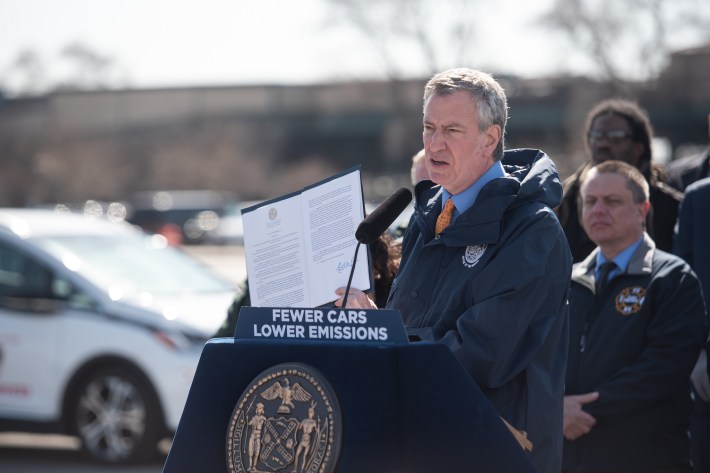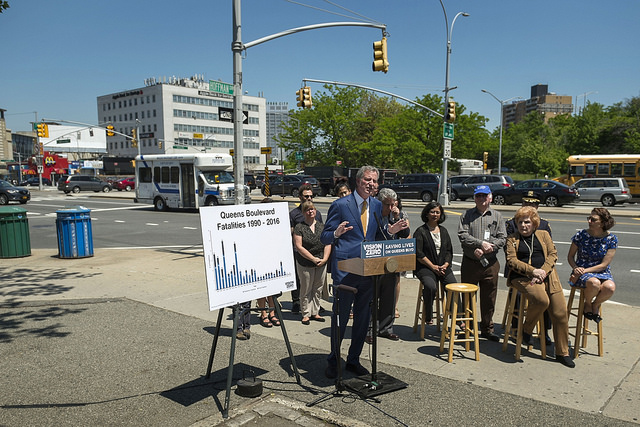He won't say the words "bike lane."
Mayor de Blasio declined to commit to installing a protected bike lane — which is his own administration's plan — as part of the long-delayed final phase of the Queens Boulevard safety redesign.
Under questioning from Streetsblog on Thursday, de Blasio apparently felt he could not even utter the words — bike lane — regarding a project that is his signature Vision Zero achievement, but is opposed by Queens Council Member Karen Koslowitz, whose support de Blasio needs for an unrelated jail he hopes to build.
Question: When is the bike lane going to get implemented on Queens Boulevard?
Mayor: “We have to work out the timing. There’s more to be done on that. Obviously, we’ve been very committed to addressing the issues on Queens Boulevard. It’s been one of the number one priorities under Vision Zero. More to come, but there’s a lot of details to work through.
Follow-up: Can you promise that the bike lane is going to happen?
Mayor: “I can promise that on Queens Boulevard we’re going to ultimately follow through on the vision that we put forward. I can’t tell you the exact timing and details because we’re still working on them.”
The protected bike lane is a key element of the first three phases of the Queens Boulevard project installed between 2015 and 2017 — improvements that have reduced crashes along the roadway formerly known as "the Boulevard of Death."
The mayor's comments echoed what he said back in Nov. 1, when he assured the public of his "commitment to Queens Boulevard" — again without mentioning the bike lane that was at one time central to that commitment.

Indeed, the "vision" the city put forward last spring included extending the protected bike lanes from their current terminus at Yellowstone Boulevard to Union Turnpike. But de Blasio's refusal to commit to a bike lane in phase IV is contrary to his position in 2016, when he overruled Queens Community Board 4, which had opposed the second phase of the bike lane project.
"Achieving Vision Zero means protecting the lives of everyone on our streets, whether they are walking, in a wheelchair, in a car or on a bike," Hizzoner said at the time.
That mindset informed the DOT's approach to the project's subsequent phases: Queens Community Board 6 overwhelmingly endorsed the Rego Park segment of the project in June 2017. Last year, DOT officials told the CB6 members that the Forest Hills phase would be implemented in July, regardless of the board's support or opposition, because it was a "mayoral priority."
July came and went, then seven more months. The bike lane and accompanying safety improvements have still not been installed.
One clear explanation for the mayor's newfound reticence: Koslowitz turned against the project last year after some Queens Boulevard merchants complained that their business would be hurt in the exchange of some on-street car storage for safety. Last week, Gothamist reported that the bike lanes are caught up in the politics of the jail, since the city is counting on Koslowitz's support for the jail project. Streetsblog had reported on that possible quid-pro-quo back in November.
Of course, parking alone fails to explain the financial struggles of Queens Boulevard small businesses — particularly since the spots in question were only added in recent decades. More likely, changing tastes and shopping patterns, as well as rising rents, have hurt those businesses bottom lines.
Thursday's comments from the mayor came just one day after he met privately with Koslowitz and other neighborhood civic groups to pitch his plans to build one of four new borough-based jails in nearby Kew Gardens.
De Blasio told Streetsblog that the bike lanes did not come up during his meeting with Koslowitz.
But Koslowitz has been running scared from the bike lane project ever since the owner of Ben's Best kosher deli closed shop and blamed his demise on the bike lanes — failing to acknowledge the role of his own management practices, or the ongoing decline of Jewish delis that has touched every corner of the city. When it was still open, Ben's charged $16.95 for a brisket sandwich — a high price in a changing neighborhood with many cheaper lunch options.
Meanwhile, the first three phases of Queens Boulevard bike lanes and pedestrian improvements have been a resounding success. The roadway once had as many as 25 fatalities per year, but just three people have been killed in traffic crashes there since DOT began its upgrade in 2015.
Pedestrian injuries have dropped 63 percent and cycling injuries have increased only slightly despite a huge jump in the number of people riding.
🎶 Meet the new BS — same as the old BS.
— Streetsblog New York (@StreetsblogNYC) March 28, 2019
Eyeaaaahhhhhhhhh!
🎶 https://t.co/7SMHypFAzk






